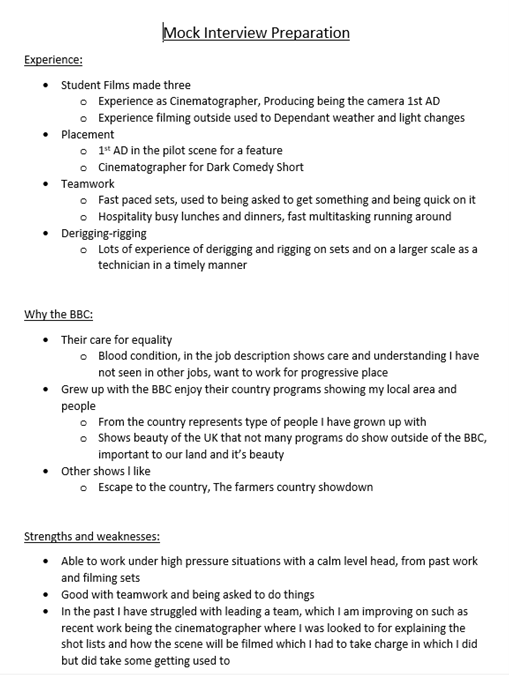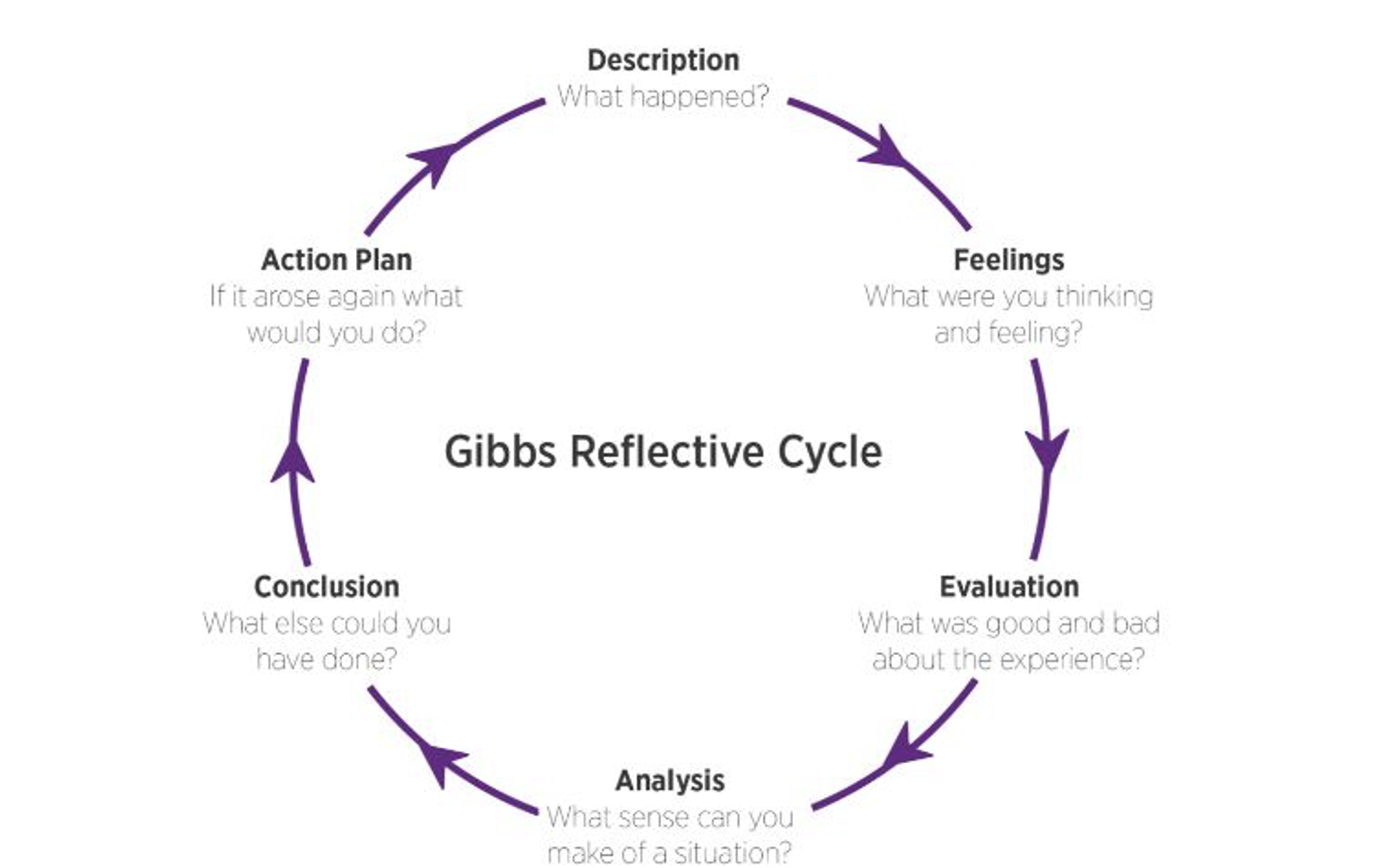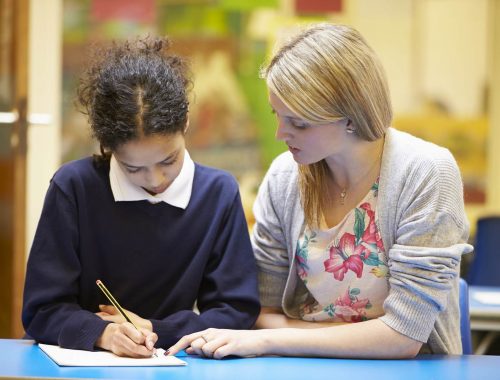Presenting Yourself, The Interview Process
Preparation

In order to prepare for the simulated interview for a job with the BBC show ‘Countryfile’ I researched into other shows of similar genre to help demonstrate my interest in the company and this production. In their advert the BBC’s included information on its’ ‘Care For Equality’ initiative. This was notable and applicable to me due to my blood dyscrasia and I highlighted why it is especially appropriate to work for a company that states in their job descriptions that they take account of disabilities. Also simultaneously demonstrating that I have looked into the BBC’s standards and values. Anecdotes were prepared from relevant and non-relevant work experience relating to previous methods of dealing with difficult situations, to help prove myself as a worthy candidate for the post. Research into cinematography journal articles was completed in order to help articulate why I enjoy cinematography, and understand it’s importance to film through quotes such as “through cinematography the visual arts have a chance to travel to a larger audience” (Heer, 1982).
Reflection on the interview
Many references to previous work were made to prove my competency for the role, which I felt was of benefited in the interview, in addition to portraying myself as hardworking and organised. I was nervous when speaking during the simulated interview and as a result became jittery and stumbled over some points I was trying to make. This unfortunately diminished the professional demeanour I was trying to create. In addition I did struggle in making eye contact during the interview, which might have given the impression of insecurity, that in turn might be interpreted as a lack of assertiveness and therefore to be a hindrance when working on sets. Good points were made during the interview but my presentation lacked impact which could make me less likely to be successful in real life interviews.
Evaluation of the interview
The simulated interviews highlighted that I need to improve my presentation skills, because from an interviewers perspective “participants use language and other sign systems in spatiotemporally, socially situated interactions in ways that reflect and create those interactions” (Koven, 2014). The social signs I projected in the interview indicated a lack of confidence which resulted in explanations of my work experience and personal details being presented with possibly less conviction. Peer review emphasized this weakness and impressed on the need to practice this and improve my presentation skills. Feedback from peers stated that I connected past work experience and situational examples well to the role I was applying for. This experience has indicated that condensing on my past work experience rehearsing it into a fluid script is a necessity, so in future interviews I will be less likely to trip over my words and avoid repetition.
Employing the Gibbs Reflective Cycle
I have used the Gibbs Reflective Cycle, to reflect upon the simulated interview, as this reflective cycle facilitates discussion of “emotions honestly” (Ikin, R., & Syafryadin, 2020) and prompts me to analytically look at how the interview went, and to separate the positives and negatives in order to learn from my mistakes. By identifying my mistakes the Gibbs Reflective Cycle then prompts me to analyse these mistakes from the interview and is of benefit as solutions need to be formulated on how to avoid these errors in the future. In the “Analysis stage, the writer relates to others’ experiences and theories” (Ikin, R., & Syafryadin, 2020), so not only does this reflective cycle help me to analyse my limitations but it also prompts me to consider my peers interviews, what they did well, and how I can learn from what they were good at. I could then consider how I might incorporate these into interviews in the future. The body language from one of my peers was open and they maintained eye contact throughout the interview, which made delivery of their points clearer and possibly enhanced their chance of gaining employment.

Conclusion
Reflection on the simulated interview clearly shows that my presentation needs to be improved, more open body language is required, and that there is a need to speak clearly and at a higher volume. However the points I made were good but need more rehearsing to ensure they are more concise to prevent repetition, and avoid drifting themes.
My Action Plan
To improve on my interview skills I will book a meeting with the Queens University Belfast Careers Guide in order to practice more simulated interviews with the aim to develop an open presentation, including better body language and clearer speech. This will be helped by the careers staff as they will correct me during the interview process and assist in building a habit of an improved presentation of both myself and the way I speak during interviews. Using this I will also practice answering questions in relation to the jobs I will be applying for, and so will improve on how I answer interview questions. By rehearsing these questions they will become familiar and I should be able to avoid going into excessive detail and repeating myself. Through this plan of practicing interviews I shall improve my employment potential by becoming well trained for interviews, which in turn will help me obtain the positions I apply for.
Bibliography
Heer, J. (1982). Cinematography. BOMB, 1, 46-69. Retrieved February 9th, 2023, from http://www.jstor.org/stable/40422330
Ikin, S. A., R., B. F., & Syafryadin. (2020). Using Gibbs’ Reflective Cycle In Making Reflections Of Literary Analysis. Indonesian EFL Journal. Retrieved February 10th, 2023, from https://doi.org/10.25134/ieflj.v6i2.3382
Koven, M. (2014). Interviewing: Practice, Ideology, Genre, and Intertextuality. Annual Review of Anthropology, 43, 499-520. Retrieved February 9th, 2023, from http://www.jstor.org/stable/43049588
D-DAY
You May Also Like

The World of Theatre upon Reflection
30 November 2022
Job Interviews: Selling Yourself For A Pay Cheque
24 February 2023
